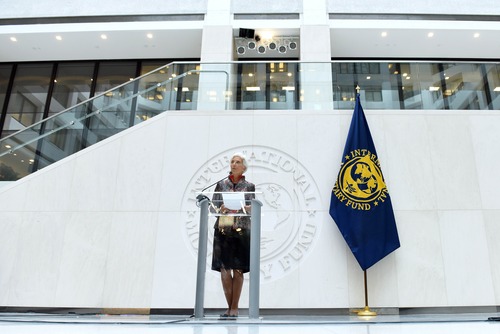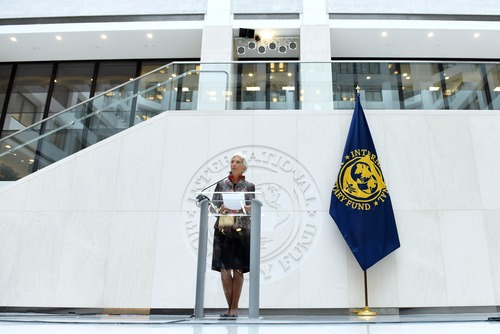
Christine Lagarde, the then Managing Director of the International Monetary Fund (IMF), speaks on launch of the new Special Drawing Rights (SDR) currency basket including the Chinese currency, the Renminbi (RMB) in Washington D.C., the United States on Sept. 30, 2016. (Xinhua/Yin Bogu)
BEIJING, May 18 (Xinhua) -- The International Monetary Fund (IMF) announced recently an increase in the weighting of the Chinese currency Renminbi (RMB) in the Special Drawing Rights (SDR) currency basket from 10.92 percent to 12.28 percent, marking a new milestone in the internationalization of the RMB.
This is the first review since the RMB was included in the SDR currency basket in 2016. According to experts, the increase in the weighting of RMB, caused by favorable factors such as the rising share of China's exports in the world and effective from August 1, 2022, will facilitate the circulation of RMB in the global market.
-- Progress made on financial market reforms in China
During this round of review, the IMF Executive Board unanimously decided to maintain the current composition of the SDR currency basket consisting of the U.S. dollar, the euro, the RMB, the Japanese yen, and the British pound, and increase the weighting of the RMB and the U.S. dollar by 1.36 and 1.65 percentage points respectively. At the same time, the weights for the euro, the Japanese yen and the British pound were lowered from 30.93 percent, 8.33 percent and 8.09 percent to 29.31 percent, 7.59 percent and 7.44 percent, respectively.
It is noteworthy that the U.S. dollar still ranks the first in terms of weighting, with its share rising to 43.38 percent.
As a young participant in the SDR basket, the RMB ranks the third in terms of weighting, the same as the ranking when it was put into the basket in 2016, but with a smaller difference with the euro which ranks the second.
IMF said in a statement that the latest weights were based on developments in trade and financial markets over the period from 2017 to 2021. Executive directors broadly acknowledged the progress made on financial market reforms in China.
-- Dual factors contribute to increase in the weighting of RMB
Wang Youxin, a senior researcher at the Bank of China research institute, was quoted as saying by Chinanews.com.cn that there are two main factors behind the increase in the weighting of RMB: the higher share of China's exports in the global market and the more freely usable RMB.
According to the SDR currency weight calculation formula, the export criterion and the freely usable criterion each accounts for about 50 percent of weights. The freely usable criterion consists of a number of indicators, including the proportion of RMB in official reserve holdings, foreign exchange transactions, international banking liabilities, and international debt securities.
Since 2015, the share of China's exports in the world has seen an increase. Since late 2019, stable industrial and supply chains in China have boosted the country's exports despite weak external market caused by COVID-19 pandemic.
Data shows that in 2021, China's total trade in goods and services grew to 6.9 trillion U.S. dollars, ranking the first in the world for two consecutive years. China's share of goods exports in the international market has risen from 11 percent to 15 percent.
Apart from these, the rise in the share of RMB in global foreign exchange reserves and foreign exchange transactions in the past few years also led to an increase in the weighting of RMB in the SDR currency basket, said Wang.
According to the Currency Composition of Official Foreign Exchange Reserves released by the IMF in March 2022, in the fourth quarter of 2021, the total RMB foreign exchange reserves amounted to 336.1 billion U.S. dollars. The share of RMB among global foreign exchange reserves stood at 2.79 percent, hitting another new high. Currently, RMB foreign exchange reserves rank the fifth in the world.
-- Weight adjustment conducive to steady development of RMB internationalization
According to Wang, as a supranational currency, SDR does not play a prominent role in practical operation, but it has important symbolic significance for the internationalization of RMB.
The rise in the weighting of RMB in SDR represents a growing recognition from international investors and its wider application in international trade, investment and financing, foreign exchange transactions and other fields. The RMB is gradually becoming an important supplement to the international monetary system.
In the future, with the improvement of market recognition, more global funds will invest in RMB assets under the passive trading strategy and correspondingly, derivative transactions will also increase. The internationalization of RMB will enter a stage of sound development.
The RMB will make continuous progress in multilateral use, international payments, international investment and financing, cross-border asset allocation, foreign exchange transactions, and international reserves, said the report citing Wang.
When it comes to the impact on RMB exchange rate, Wang said the bigger weight of RMB in the SDR currency basket sends a positive signal, represents progress in the international use of RMB, and may improve market sentiment in the short term and benefit cross-border capital flows in the medium and long term. But its impact on the current exchange rate trend will be limited. (Edited by Duan Jing with Xinhua Silk Road, duanjing@xinhua.org)




 A single purchase
A single purchase









